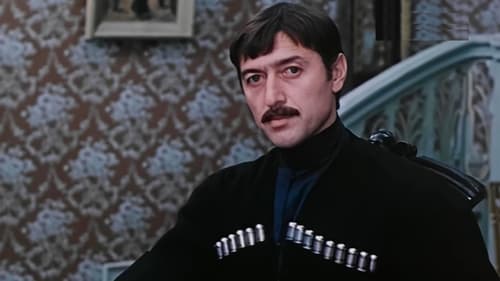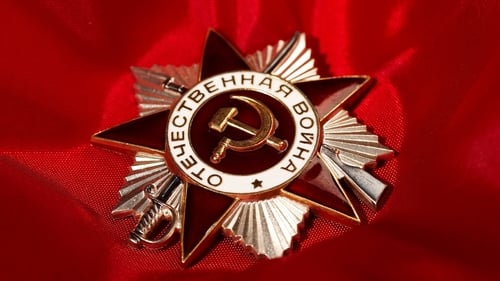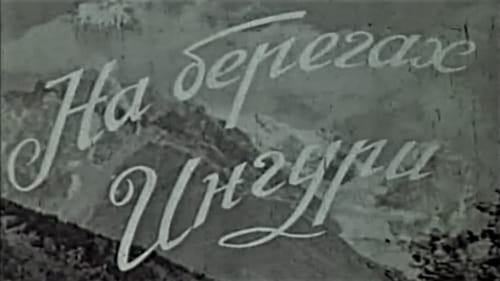Bukhuti Zakariadze
Nascimento : 1913-06-13, Sangachal, Baku Governorate, Russian Empire
Morte : 1988-02-12

Biopic about Marshal Georgi Zhukov. Documentary footage from WWII and dramatization played by Russian and German actors.

Duru, The Landlord Tavern
A just man becomes an outlaw. He is pursued by the police over the years, while he tries to fight the injustice in the world, but he can't figure out the minds of his fellow men, and is often misunderstood.

The film is based on a real story. Climbers found the purse of a military postman killed during World War II, letters sent 30 years later.

Murad, a Muslim guy brought up in the noisy yard of Tbilisi, falls in love with a Belorussian girl Anya, who lives in the same neighborhood, though Anya is impervious to Murad’s feelings.

Stalin
Parte 1 e Parte 2

Stalin
A grandiose military film epic, which does not know analogues in world cinema: the history of the Great Patriotic War from the Battle of the Kursk Bulge to the installation of the Banner of Victory over the Reichstag - "Liberation".

Josef Stalin
O trabalho mais famoso do diretor de cinema russo Yuri Ozerov é o épico Osvobozhdenie (A Libertação) sobre a WWII, feito em cinco partes e 470 minutos, que foi muito popular em seu país. Cada uma das duas primeiras partes foi visto por 56 milhões de pessoas. Osvobozhdenie (1967-1971), seu maior sucesso, foi notável não só por suas impressionantes cenas de batalha, mas também por sua tentativa de mostrar a guerra pela perspectiva dos soldados russos comuns. 1 O Arco de Fogo 2 O Avanço 3 Rumo ao Golpe Principal (parte 1) 3 Rumo ao Golpe Principal (parte 2) 4 A Batalha por Berlim 5 O Ataque Final

1942, the German Wehrmacht is trying to capture the Baku oilfields at the Black sea. Their biggest obstacle are the Caucasian Mountains and few Russians soldiers to stop them. The story revolves around an important Mountain Pass, that is heavily contested by both sides.

Magaraev
The end of the civil war. A sailor Alexey Zvorykin is appointed Director of the automobile plant. After training in America at Ford he finishes release of the first Soviet lorry and personally takes part in the international motor rally in Sands of Kara-Kuma which is won by our car.

The film is about the painful feeling of unrequited love and introduces us to the episode of the life of a young, virtuous and intelligent doctor, who is tired of the monotony of life.

Ilo
A young idealist takes a job at a local state run winery only to discover and become disillusioned by the corruption of the Soviet State.

Beqnu
Georgian film.

Markozi
In Arabic, “mameluke” means a white slave, a prisoner. In Egypt, this name was given to prisoners of war who had been sold into slavery from Georgia and other countries of the Caucasus. The action of this drama starts in Georgia in the late 18th century. Two friends are abducted and sold into slavery. One ends up in Egypt, the other - in Venice. Years later, they meet by the ancient pyramids, in the desert where a battle is going on between the armies of Bonaparte and Ali-bey, the ruler of Egypt. In a combat with a French officer, the Mameluke injures him. Falling from his horse onto the sand, the officer exclaims in Georgian: “Vai, nana!” (“Oh, mother!”). And the Mameluke recognizes in him a mate of his childhood games.

This chamber drama is set in Georgia on the turn of the 19th and 20th centuries. A simple peasant family makes its living by selling yogurt which the Magdany widow takes every morning to the town market. Once, in their mother’s absence, the children – six-year-old Mikho and three-year-old Kato – found an abandoned donkey on a road leading to their village. The foundling was fed, tended, and the moment the donkey opened its big, tender eyes, it was named “Lurdja”, which means “blue-eyed”. Surrounded by love and care, the donkey became a big help in the poor household. But this idyll was not to last long…











